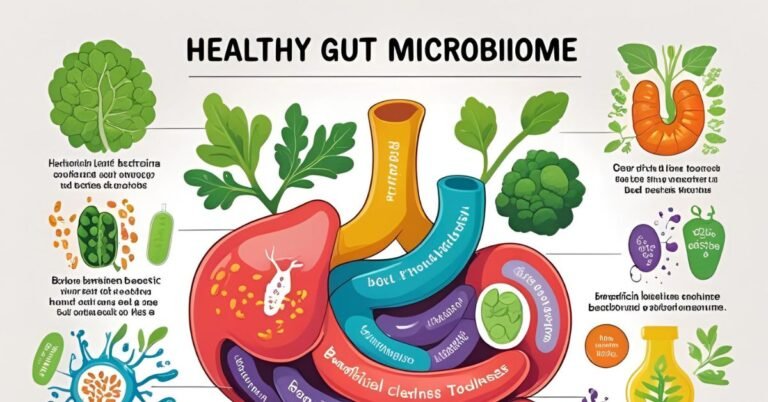How Stress Affects Digestion: The Ultimate Guide to a Calmer Gut (2025) 🧠➰
Understanding how stress affects digestion is fundamental to modern wellness. If you’ve ever felt “butterflies” in your stomach before a big event or rushed to the bathroom during a stressful situation, you’ve experienced the powerful and instantaneous connection between your brain and your gut. This isn’t just a feeling; it’s a complex biological response.
Your gut is often called your “second brain,” and for good reason. It’s lined with millions of nerve cells and is in constant communication with your actual brain via the gut-brain axis. When your brain perceives a threat—whether it’s a real danger or the pressure of a looming deadline—it triggers a cascade of physiological changes that can wreak havoc on your digestive system.
This guide will explore the science behind why your stomach gets tied in knots when you’re stressed and provide actionable, holistic strategies to soothe both your mind and your gut.
🔑 Key Takeaways
- The Gut-Brain Axis: Your brain and gut are directly connected via the vagus nerve. What affects your mind instantly affects your digestion.
- Cortisol’s Role: The stress hormone cortisol slows down digestion, alters stomach acid levels, and can increase intestinal permeability (“leaky gut”).
- Fight-or-Flight Response: When stressed, your body diverts blood flow away from your digestive system to your muscles, effectively pausing digestion.
- The Holistic Solution: The most effective approach is synergistic: combine stress management techniques (like meditation) with gut-supportive nutrition and supplements (like adaptogens and probiotics).
Table of Contents
The Science of a Stressed Gut: The Gut-Brain Axis Explained 💡
Before we dive into the problems, let’s cover the “how.” The primary communication highway between your brain and gut is the vagus nerve. Think of it as a super-fast fiber optic cable sending signals in both directions.
- Deeper Mechanism: When you experience stress, your brain activates the HPA (Hypothalamic-Pituitary-Adrenal) axis, culminating in the release of cortisol. This “fight-or-flight” hormone tells your body to prioritize immediate survival. As a result, functions deemed “non-essential” in that moment, like digestion, are slowed down or halted. Blood is shunted away from the stomach and intestines to your muscles, preparing you to flee. This mechanism, while brilliant for short-term survival, becomes damaging when stress is chronic.
- Data Callout: 📈 According to the American Psychological Association, prolonged stress can alter the composition of your gut microbiota, partly due to the way stress hormones directly impact the gut environment.
This shows that managing your stress is not just a mental health practice—it’s a critical component of how to improve gut health.

How Stress Affects Digestion: 3 Ways it Disrupts Your Gut 🌪️
Here are three proven ways that long-term stress can damage your gut.
1. Cortisol: Slows Motility & Alters Stomach Acid
Chronically high cortisol can slow down peristalsis (the muscular contractions that move food through your gut), leading to constipation and bloating. It can also alter stomach acid levels, leading to heartburn and poor initial breakdown of food.
Actionable Tip: ✨ To counter the effects of cortisol, consider an adaptogen. We have a full guide on how Ashwagandha for stress relief can help modulate cortisol levels.
2. Increased Intestinal Permeability (Leaky Gut)
Stress has been shown to weaken the “tight junctions” that hold your intestinal cells together. This can lead to a “leaky gut,” where undigested food particles and toxins enter the bloodstream, triggering inflammation.
- Scientific Nuance: While the link between stress and increased intestinal permeability is well-documented in clinical studies, “leaky gut syndrome” as a distinct medical diagnosis is still a topic of ongoing research. However, supporting the gut barrier is a key therapeutic goal.
Actionable Tip: 🛡️ To support your gut lining against stress, consider supplementing with L-Glutamine for gut health, which provides the direct fuel your intestinal cells need to stay strong.
3. Negative Changes to Your Microbiome
The stress response can decrease the population of beneficial bacteria like Lactobacillus and Bifidobacterium while allowing potentially harmful bacteria to flourish. This imbalance, called dysbiosis, can lead to a host of digestive issues.
Actionable Tip: 💪 To build a more stress-resilient microbiome, focus on a diet rich in diverse plant fibers and consider a high-quality probiotic supplement.
A Synergistic Strategy for a Calmer Gut
The key to healing a stressed gut is to address both sides of the equation simultaneously.
| Stress Management | Gut Support | Why it Works |
| Mindfulness/Meditation | Probiotics | Calms the nervous system while repopulating beneficial gut bacteria. |
| Gentle Exercise (Yoga, Walking) | High-Fiber Diet | Reduces cortisol while feeding beneficial microbes. |
| Adequate Sleep | L-Glutamine | Allows the body to repair while providing the building blocks for the gut lining. |
Our Top Supplement Picks for the Stress-Gut Connection
- For Stress Resilience (Adaptogen): Youtheory, Ashwagandha. Using the clinically-studied KSM-66® extract, this supplement helps your body manage cortisol levels, directly addressing the root hormonal cause of stress-induced digestive issues.
- For a Resilient Microbiome (Probiotic): California Gold Nutrition, LactoBif 30 Probiotics. A broad-spectrum probiotic with a high CFU count is essential to support a microbiome under stress. This is one of iHerb’s top-rated and best-value options.
Frequently Asked Questions (FAQ)
Q: What does a “stressed gut” feel like? A: Symptoms can vary widely, but often include bloating, gas, abdominal pain or cramping, constipation, diarrhea, and a feeling of “butterflies” or general unease in your stomach.
Q: Can stress cause permanent stomach problems like IBS? A: While stress doesn’t typically cause a condition like Crohn’s on its own, a foundational review by the World Journal of Gastroenterology confirms that it is a major factor in triggering and exacerbating the symptoms of functional gastrointestinal disorders like Irritable Bowel Syndrome (IBS).
Q: How can I quickly calm a stressed stomach? A: For immediate relief, try deep, slow breathing (diaphragmatic breathing) to activate the vagus nerve and calm the fight-or-flight response. Sipping on a warm, soothing tea like ginger or peppermint can also help relax the stomach muscles.
Start Your Journey to a More Resilient Gut
Understanding how stress affects digestion empowers you to take back control. By actively managing your stress while simultaneously supporting your gut health, you can build a resilient system that works with you, not against you.
What’s your go-to method for calming a stressed stomach? Share your tips in the comments below!
[Explore Top-Rated Gut & Stress Support on iHerb Now!]
(As an affiliate, we may earn a commission from qualifying purchases at no extra cost to you. We only recommend products we trust.)
About the Author
This article was written and medically reviewed by the BellyBrainBed Editorial Team. Our team is composed of certified health coaches, nutritionists, and sleep science enthusiasts dedicated to providing accurate, evidence-based information to help you achieve optimal wellness. We believe in transparency and trust, and every piece of content is rigorously checked to meet our high E-E-A-T standards. [Learn more about our editorial process]







One Comment